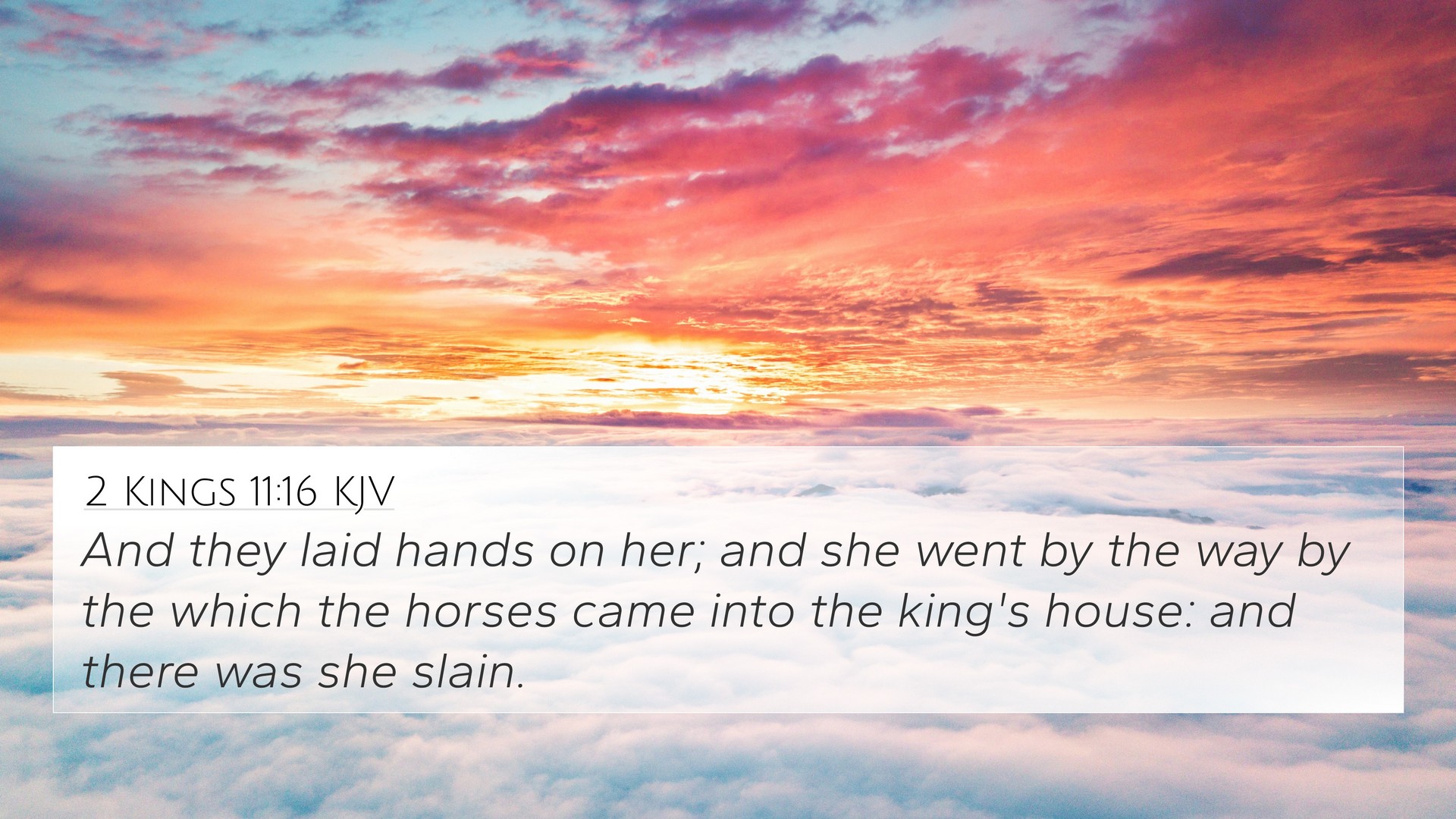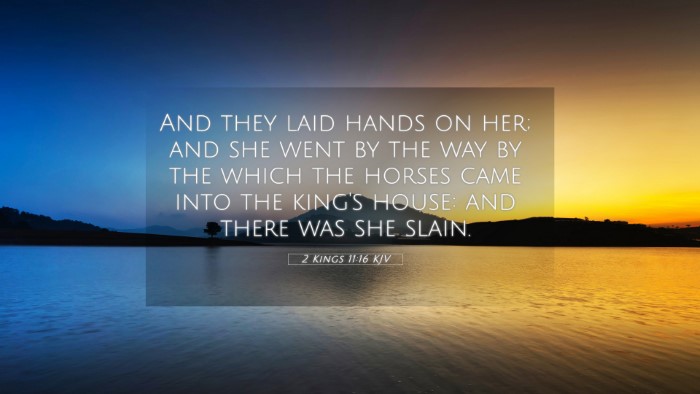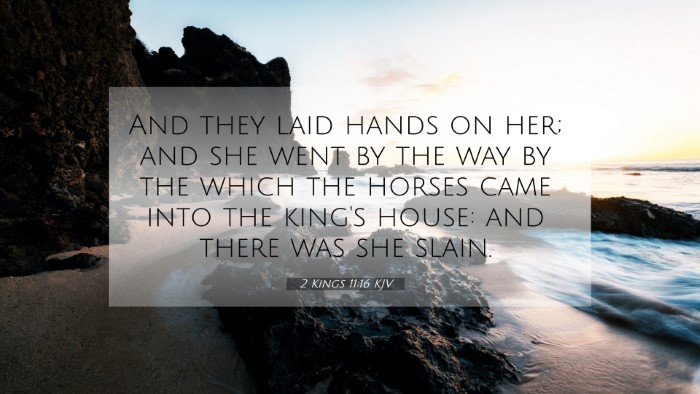Old Testament
Genesis Exodus Leviticus Numbers Deuteronomy Joshua Judges Ruth 1 Samuel 2 Samuel 1 Kings 2 Kings 1 Chronicles 2 Chronicles Ezra Nehemiah Esther Job Psalms Proverbs Ecclesiastes Song of Solomon Isaiah Jeremiah Lamentations Ezekiel Daniel Hosea Joel Amos Obadiah Jonah Micah Nahum Habakkuk Zephaniah Haggai Zechariah Malachi2 Kings 11:16 Similar Verses
2 Kings 11:16 Cross References
And they laid hands on her; and she went by the way by the which the horses came into the king's house: and there was she slain.
Uncover the Rich Themes and Topics of This Bible Verse
Listed below are the Bible themes associated with 2 Kings 11:16. We invite you to explore each theme to gain deeper insights into the Scriptures.
2 Kings 11:16 Cross Reference Verses
This section features a detailed cross-reference designed to enrich your understanding of the Scriptures. Below, you will find carefully selected verses that echo the themes and teachings related to 2 Kings 11:16 KJV. Click on any image to explore detailed analyses of related Bible verses and uncover deeper theological insights.
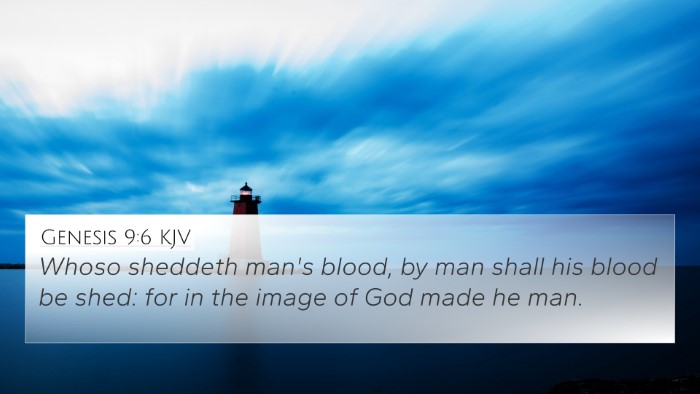
Genesis 9:6 (KJV) »
Whoso sheddeth man's blood, by man shall his blood be shed: for in the image of God made he man.
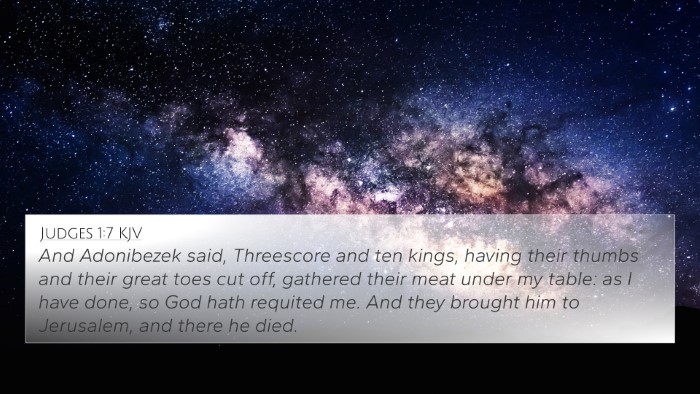
Judges 1:7 (KJV) »
And Adonibezek said, Threescore and ten kings, having their thumbs and their great toes cut off, gathered their meat under my table: as I have done, so God hath requited me. And they brought him to Jerusalem, and there he died.
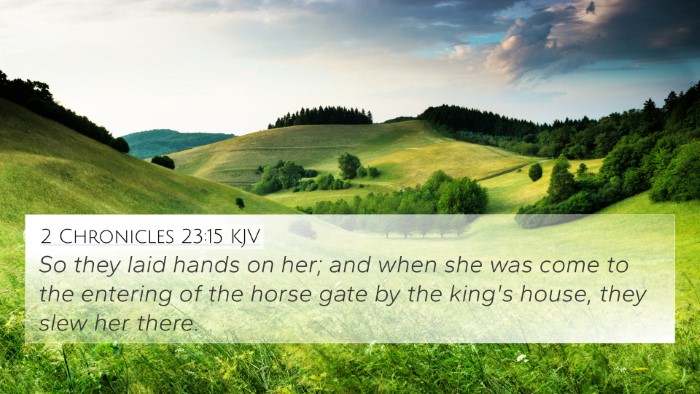
2 Chronicles 23:15 (KJV) »
So they laid hands on her; and when she was come to the entering of the horse gate by the king's house, they slew her there.
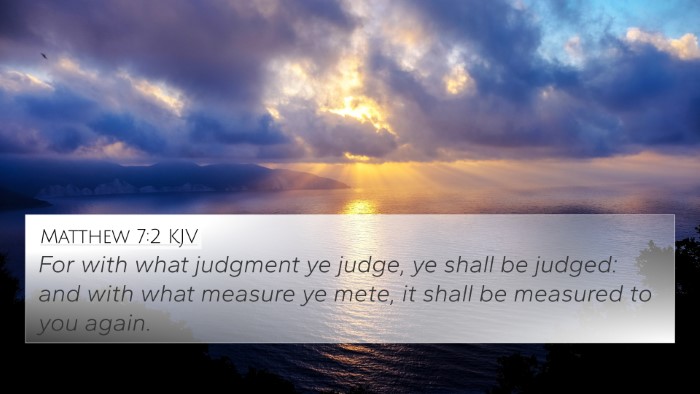
Matthew 7:2 (KJV) »
For with what judgment ye judge, ye shall be judged: and with what measure ye mete, it shall be measured to you again.
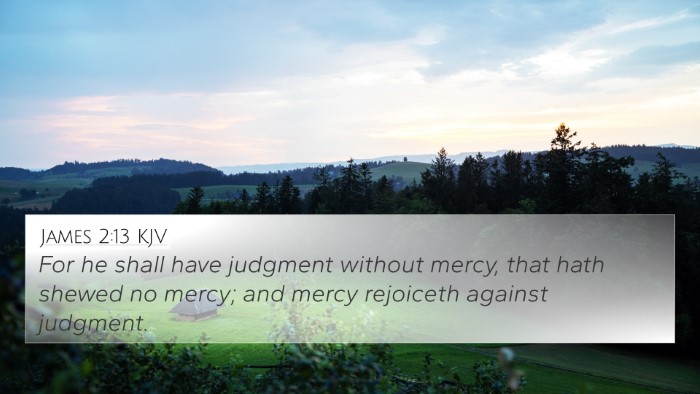
James 2:13 (KJV) »
For he shall have judgment without mercy, that hath shewed no mercy; and mercy rejoiceth against judgment.
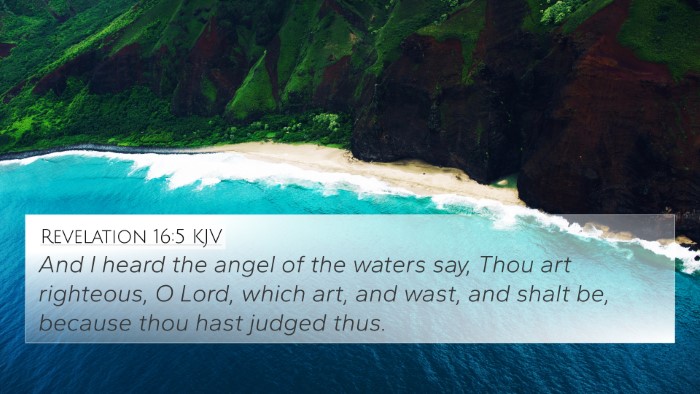
Revelation 16:5 (KJV) »
And I heard the angel of the waters say, Thou art righteous, O Lord, which art, and wast, and shalt be, because thou hast judged thus.
2 Kings 11:16 Verse Analysis and Similar Verses
Understanding 2 Kings 11:16
Verse Context: 2 Kings 11:16 states, "And they laid hands on her; and she went by the way by the entrance of the horse gate to the king's house: and there was she slain." This verse depicts a significant moment in the history of Judah involving the usurpation and overthrow of Athaliah, a queen who had taken control after the death of her son, King Ahaziah.
Meaning of the Verse:
This passage illustrates the fierce struggle for power and the divine providence that intervenes in human affairs. The execution of Athaliah represents God's judgment against idolatry and tyranny, rooting the narrative in the themes of justice, divine sovereignty, and the restoration of rightful leadership in Judah.
Main Themes:
- Judgment: Athaliah's demise is seen as a fulfillment of God's justice against those who lead His people astray.
- Divine Sovereignty: The events reveal the hand of God in maintaining the Davidic lineage through Joash, the rightful heir.
- Restoration: The overthrow of a tyrant sets the stage for the return to faithful worship and governance in Judah.
Insights from Public Domain Commentaries:
Matthew Henry's Commentary:
Henry emphasizes the swift and decisive action against Athaliah, viewing it as a necessary step to cleanse the nation from her idolatrous influence. He notes how the public's support was evident in their agreement to her execution, indicating a collective desire for righteousness.
Albert Barnes' Notes:
Barnes explains the significance of the "horse gate" as a symbol of military might, suggesting Athaliah's arrogance in her rule was met with a swift, military-style judgment. He reflects on the boldness of Jehoiada and the captains who executed the plan, highlighting the leadership qualities that restore proper order.
Adam Clarke's Commentary:
Clarke provides an analytical view of the historical context, noting how Athaliah’s actions were driven by a passion for power. He correlates her fate with the broader narrative of God’s redemptive history, culminating in the eventual rise of Joash, who would lead Judah back to covenant faithfulness.
Cross-References:
- 2 Kings 11:1-4: The plot against Athaliah is revealed, showing the preparation for her overthrow.
- 2 Chronicles 22:10-12: A parallel account detailing Athaliah's rule and the preservation of Joash by Jehoiada.
- 2 Kings 8:26: References the wickedness of Athaliah and her familial connections, leading to her ruling influence.
- Jeremiah 22:30: Discusses the curse on Jehoiakim, tied to the Davidic line and God's covenant promises.
- Matthew 1:12: Connects the genealogy of Christ back to the lineage of those who were preserved despite Athaliah's reforms.
- Revelation 19:2: Reflects on God's true judgment against the evils represented by figures like Athaliah.
- Isaiah 14:20: Speaks of the fate of those oppressors and ungodly leaders, reminiscent of Athaliah's end.
Conclusion
In summary, 2 Kings 11:16 serves as a pivotal verse illustrating themes of judgment, divine authority, and restoration. By examining this verse and its surrounding context through various commentaries, we gain a deeper understanding of the importance of rightful leadership and God's hand in shaping the history of His people. Observing cross-references further enriches our comprehension of the interconnectedness of scriptural narratives.
For Further Study:
- Understanding the Significance of Kingship in Israel: Explore how leadership is portrayed across the Old Testament.
- Inter-Biblical Dialogues: Analyze how themes in the Old Testament echo in the New Testament.
- Bible Concordance Tools: Use resources to dig deeper into thematic connections between verses.
- Cross-reference Bible Study Methods: Learn techniques for identifying related verses in your personal study.
